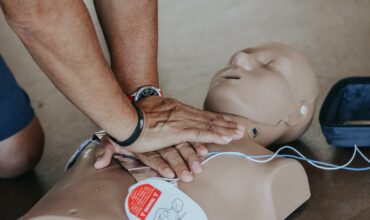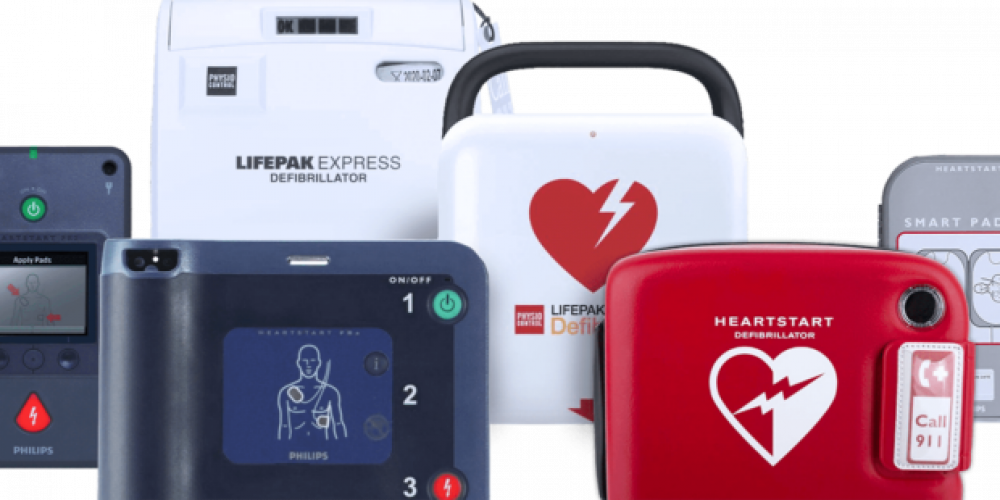- Your cart is empty
- Continue Shopping


A Home Automated External Defibrillator (AED) is a portable medical device designed to diagnose and treat sudden cardiac arrest. It delivers an electric shock through the chest to the heart to restore a normal heartbeat.
AEDs are designed to be simple to use for non-medical individuals with clear instructions, voice prompts, and visual guides.
Home AEDs are intended for personal use in a residential setting, making it possible for individuals to respond rapidly to a cardiac emergency before professional medical help arrives. They are particularly valuable in homes with individuals at high risk for heart attacks or other heart-related emergencies. Having an AED at home can significantly increase the chances of survival in such emergencies
It is a well-documented fact that the majority of Sudden Cardiac Arrests happen outside of the hospital, with most events taking place at home.
For those with heightened risk factors, this brings up the question of what can be done to give them the best chance of survival during an SCA. One possible solution is to purchase a home AED.
We often receive questions pertaining to which device is best for home use? What features should I consider? How important is CPR during a cardiac arrest? How much does an AED cost?
While there is no one-size-fits-all answer, we aim to arm you with enough information to make the right decision for you.
Check out our Ultimate Guide to buying the right AED for you.
Save on a new Philips HeartStart Home AED with coupon code: AED200
The Philips HeartStart Home, ZOLL AED Plus, and LIFEPAK CR2 are among the top choices for home AEDs.
The Philips HeartStart Home is highly regarded for its reliability and ease of use, featuring guided voice instructions and smart sensors that adjust the shock level automatically based on the patient’s needs, making it ideal for use by laypeople.
The ZOLL AED Plus stands out with its real-time feedback capability, offering audio and visual prompts during CPR, including unique alerts to “push harder” if chest compressions aren’t deep enough.
Lastly, the LIFEPAK CR2 brings advanced technology into the home with features like rapid shock delivery and cprINSIGHT analysis technology, ensuring efficiency and ease of use during rescue operations.
Each model offers distinct advantages, and the best choice depends on specific user preferences and the health needs of household members.
There are several options for at-home defibrillators that range from $1,439 to $1,845+. The price can fluctuate based on features, IP Rating, and overall usability.
The Philips HeartStart Home AED is a device designed to help individuals in the event of a sudden cardiac arrest. It is a compact, lightweight device that can be easily stored in a home or office setting.
The device includes clear, step-by-step instructions and voice prompts to guide users through the process of using the AED. It is also equipped with technology that automatically analyzes the heart’s rhythm and provides the appropriate shock if necessary.
This technology helps to ensure that the user is able to quickly and effectively respond to a cardiac emergency. Overall, the Philips HeartStart Home AED is a valuable tool for individuals who want to be prepared in case of sudden cardiac arrest.
Maintenance costs are also lower than normal with the M5070A Battery and M5071A Adult Pads currently costing less than $300 every few years to replace. The device self-tests daily to ensure it is always ready to operate during an SCA event.
The ZOLL AED Plus is one of the best options for lay responders because of its CPR Feedback feature as well as ease-of-use set up.
This device walks you through what to do during a Cardiac Arrest as well as guides CPR with feedback and a metronome in order to give the victim the best chance of survival.
This device is also great for use on children as one click of a button tells the device to automatically dial back the shock on an infant or child.
The LIFEPAK CR2 combines technology and simplicity that responders often desire during an SCA event. This device comes with CPR Coaching, escalating power after each shock if necessary, and no need to use different pads for adults or children.
The device also comes with ClearVoice® Technology that adjusts the level of volume of the instructions depending on the background noise.
Loading...
If so, just fill our your email address below and submit.
Anyone can purchase an AED to keep at home, but those who are at higher risk of cardiac problems have more of an impetus to do so. Sudden Cardiac Arrest can strike anyone, of any physical condition, at any time. Studies show that proper use of an AED within the first 10 minutes of an SCA drastically increases survival rates.
Most models will run between $1,200 and $1,900, depending on the features and accessories.
The Philips HS1 or Home AED is approved by the FDA for home deployment. This is the only over-the-counter AED on the market and does not require a prescription.
Unfortunately in most cases, insurance companies will not cover the cost of an AED. If you are at a heightened risk of SCA, check with your insurance company to see what they recommend or what they will or will not cover.
Looking for the best AEDs for schools? Check out our blog.
Implementation Guide